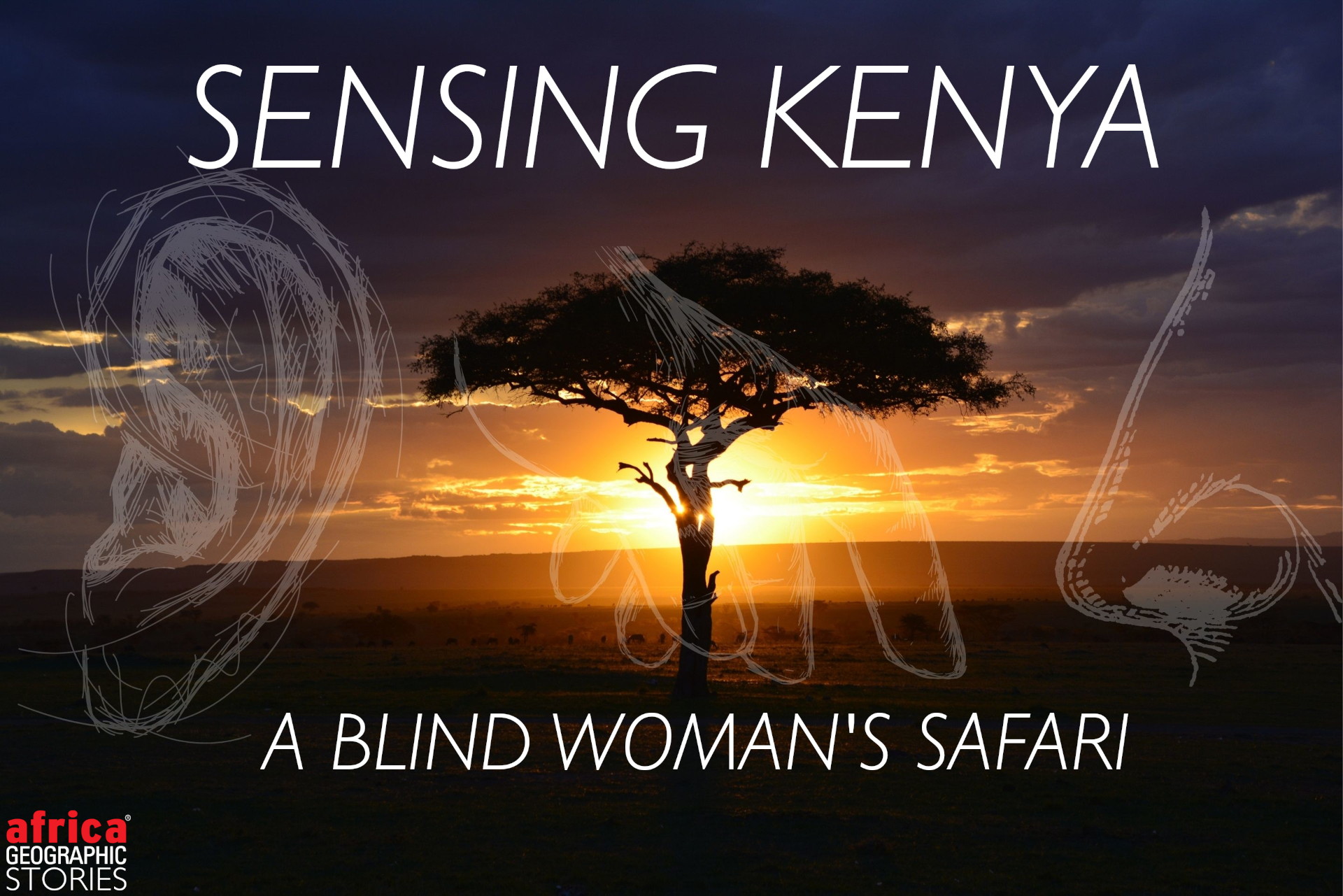
A blind woman’s safari

Imbar Golt is blind. Sensing Kenya, she experiences the wonders of Africa through the smells, sounds, tastes and feels of a camping safari.
The smells of Africa – wet earth and vegetation greet me even on the short layover in Adis Ababa on the way to Nairobi.
The procedures at the airport take little time and we are soon on our way. The smell parade begins as we clear the city limits. Animals – in the rural outskirts of Nairobi, I can already smell them. Fire and smoke from a controlled burn, a dusty scent on the long roads to Mount Kenya. This is our first stop – the smells of the forest, elephant dung and the log cabin where my friend and I spend our very first night in Africa.
A bright morning in Samburu. We are travelling parallel to a river, I hear people saying there are elephants crossing. I go to the front of the truck and hold my head out of the window to listen better. Everybody else is suddenly aware that they have to be very quiet so that I can hear. And I do! I hear the calves squealing with joy, the splashing. It sounds as if the elephants are churning the river into a froth. I am in the river with them in spirit.
‘Hey, Imbar, you want to hear wells sing?’ Avner the guide asks.
My initial thought is that he is pulling my leg. But I humour him.
‘Well, let’s hear them,’ I tell him. We get off the truck and walk on a path of soft sand. I hear people talking in the distance. Not English, so I cannot understand what they are saying. Further on, there are children playing, goats bleating and women talking. We arrive at a spot, after a very short walk. Now I hear water and men in it.
‘Well, what about your wells?’ I say, smiling at Avner.
‘Seems like they don’t want to sing today.’ he replies.
‘Yes,’ I tell him, ‘ it seems like they just want to argue about the fare for their performance.’ So, alas, we heard the non-singing wells of Sarara.
In Lake Turkana, I get my chance to swim in the alkaline water. It is almost like swimming in the dead sea of my Israel.
‘Watch out for the crocs,’ says my friend.
I am a bit apprehensive but keep lying in the water, enjoying its coolness after a long drive. To me, it is magical – the energy here is special. With the rough, sharp grass on the bank, the mosquitoes and midges at night and the crocs in the lake, I feel so much at peace here. We have a gathering with the guide after dinner. I don’t remember what he talked about – I was busy listening to a fishing owl in the distance. No hyenas tonight, they have been our auditory companions most nights, before and after Turkana, but here it’s the insects and the owl.
Birds, also, are everywhere. From the first day at the airport, until the last day in Nairobi, I hear so many new ones. Some I recognise by comparing their calls to ones I have heard in the wild and in films and some I learn through the other keen birders in the group.
In the morning we go on a boat to visit the El Molo tribe on their island. They welcome us warmly and start singing and dancing. I am enchanted – such wonderful, warm people. We clap the rhythm of the song and I feel a hand taking mine and leading me into the circle of dancers. I dance with them, with men and with women. I feel one with them and one with Africa at that moment. No separation of colour, ability or race exists. We are all people with love in our hearts for each and every one. I sing the refrain with them, or as much as possible – I cannot understand a word they are singing. But that does not matter. What matters is the joy of the song and the dancing and the total acceptance between us all. I leave Turkana with a great taste for more, but another sensory experience awaits me.
A childhood fascination of mine was volcanos. I have read everything I could about them, and toured some of the volcanic areas in the north of Israel, but I never imagined the experience I have at Marsabit.
We stop near a crater, I can hear the locals chiselling and breaking blocks of basalt from the slopes. We climb higher and I can feel a void in front of me. I bend down and touch the soft soil, the eroded basalt – oops, it’s a bit slippery underfoot! I walk back a pace. My friend lets me feel some pumice. I experience the lovely lightness of the stone and how perforated and rough the texture is. We depart down a steep slope, me walking sideways, to avoid slipping. It always works.
The Maasai Mara is where we spend our last three nights in Kenya. We stop for lunch on the first day, in the middle of the wildebeest herds. Their unique sounds, the ones I have heard on countless documentaries, are now all around me. There is also a bunch of men from our group trying to imitate them.
‘What does that sound like Imbar?’ Avner the guide asks.
‘It sounds like a bunch of crazy guys!’ I say smiling. They laugh with me.
I do not hear the leopard my group sees jumping from a tree. I do not see a crossing of the Mara River, though I hear the zebra and other animals near the river. I do not see the crocs. But I hear the hippos call in Lake Baringo and the Mara. I hear so many flamingos on Lake Naivasha and enjoy the boat rides both on Turkana and Baringo. I have experienced all that I can through the senses available to me. Yes, including taste – the fruits in Africa taste sweeter, or maybe I am biased. The vegetables are fresher and the rest of the food I enjoy with the unique flavour of Africa.
These two weeks in Kenya are a magical time. The experience is spiritual. The closeness I feel to the people and to our planet Gaia is mystical and my senses, heart and soul are all a part of it.
About the author
Imbar Golt is a blind public speaker, writer and radio presenter from Eilat, Israel. She has travelled the world and visited five continents. She loves nature and is a keen birder. She recognises birds and other animals by their calls.
To comment on this story: Login (or sign up) to our app here - it's a troll-free safe place 🙂.![]()






